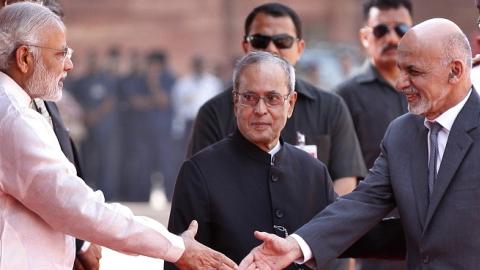After several months of trying to build bridges with Pakistan, Afghan President Ashraf Ghani will finally be in New Delhi on April 27-28 for his first official trip to India. While Washington, Beijing and the region will be interested in the outcome of his trip, it is Islamabad (or to be precise Rawalpindi) that will be nervously watching Ghani’s actions.
Pakistan’s India-centric military-intelligence establishment and strategists have always feared close ties between Delhi and Kabul. Almost seven decades later Pakistan’s nightmare may actually come true, primarily because of its policies of constant interference in the internal affairs of its western neighbour, Afghanistan.
To understand the India-Afghan-Pakistan relationship we need to go back in history. Pakistan has always been wary of close ties between its two immediate neighbours, India and Afghanistan. The belief from 1947 that India and Indian leaders did not accept partition and the creation of Pakistan led to the perception of India as an existential threat to Pakistan. In order to prevent any strategic encirclement ("pincer movement") of Pakistan it was therefore critical that Afghanistan, the neighbour on the west, be an ally. Close ties between Afghanistan and India have been seen as extremely dangerous to Pakistan’s very survival.
As I lay out in my book Explaining Pakistan’s Foreign Policy: Escaping India, (Routledge, 2011) Pakistani concerns about India-Afghan ties also have an ideological tinge. Pakistan, a state built on ideology, felt challenged by two neighbours — India and Afghanistan — both of whom shared historical and civilisational ties, seemed hostile to its very existence and emphasised their ethno-linguistic identities. Periodic Afghan support initially for Pashtun and later Baluch irredentism as well as close India-Afghan ties further reinforced the fear of a pincer movement.
For Pakistan’s leaders a pro-Pakistan anti-India Afghan regime was critical to Pakistan’s survival both in the spheres of domestic and foreign-security policy. Unable to convince the Afghans why it was critical for them to seek a closer alliance with Pakistan and why they should not have ties with India, Pakistan sought to adopt a different policy. Right from the mid-1970s, Pakistan supported non-state actors and groups in Afghanistan in the hope that one day these groups would come to power in Kabul and would help Pakistan achieve its aim of a pro-Pakistan anti-Indian Afghan government.
As part of this policy Pakistan supported primarily Islamist Pashtun non-state actors and groups in Afghanistan so as to counter nationalist (read secular) Pashtun irredentism. Pakistani support for groups like Jamiat e Islami Afghanistan of Burhanuddin Rabbani and Hizb e Islami of Gulbuddin Hekmatyar started before the Soviet invasion of Afghanistan and before any American assistance and aid poured into Pakistan. And Pakistan continued to support these groups and others even after the Soviets withdrew and the Americans lost interest in Afghanistan in the 1990s.
Over the years Pakistan has supported groups like the Afghan mujahideen during the 1980s, the Taliban during the 1990s and today it supports an assortment of groups comprising the Haqqani network, Hekmatyar’s group, the Afghan Taliban and their supporters. The rationale is still the same: a zero sum game where Pakistan believes that any Afghan government which has close ties with India will be by default anti-Pakistan.
Viewing Afghanistan through its ideological tint Pakistan’s security establishment never trusted the primarily non-Pashtun led Northern Alliance and preferred one of the Pashtun mujahideen leaders as a future head of Pakistan. Ties between Kabul and Islamabad (especially Rawalpindi) were frosty during the two terms of former President Hamid Karzai. Karzai was seen as too pro-India to be pro-Pakistan. India was one of the leading bilateral donors to Afghanistan with USD $2 billion in aid and Afghanistan signed a strategic partnership agreement with India in 2011.
When elections took place in Afghanistan in 2014, the Pakistani establishment backed Dr Ghani and not Dr Abdullah Abdullah. The rationale: Dr Abdullah was a close associate of Ahmed Shah Masood, who led the Northern Alliance against the Taliban and was perceived as antagonistic towards Pakistan and its role in Afghanistan. Dr Ghani, an academic and technocrat, with no close ties to India was seen as preferable.
When Dr Ghani took over as President it appeared like he was moving away from Karzai’s policy of close ties with India. A number of high level trips took place between Afghanistan and Pakistan with the Pakistan army chief visiting Afghanistan, President Ghani visiting Pakistan and just recently the Afghan army chief attended the passing out parade at Pakistan’s Military Academy in Kakul.
Further, Afghan army cadets were sent to Pakistan for training instead of the previous practice of sending them to India. Furthermore, when the December 2014 terror attack on a school in Peshawar took place, Afghanistan helped locate and handed over to Pakistan the culprits responsible for the attacks. Afghanistan, Pakistan and the United States have also been having discussions about how to take the process of the Taliban peace talks forward.
What appears is that President Ghani came into office prepared to give his counterparts in Pakistan a chance in order to see if Pakistan’s security establishment would actually come through on its promises. From his end Ghani has done more than was required. Unfortunately, as always, it is Pakistan that has not been able to or is unwilling to follow through on its promises.
Ghani’s upcoming visit to India will demonstrate how disenchanted he and his government are with Pakistan. From Kabul’s vantage point, Delhi provides a counterweight to Islamabad-Rawalpindi. Afghan leaders have always resented the Pakistani view that the Pakistanis know what is best for Afghanistan. Further, Afghanistan needs resources to rebuild the country and investment to move it forward. India has the resources and the investment, Pakistan does not. With this in mind it is only natural for India and Afghanistan to come closer.
As the saying goes, be careful what you wish for, it may come true. Pakistan’s worst nightmare of an Afghanistan with deep economic, security and diplomatic ties may actually come true.




















